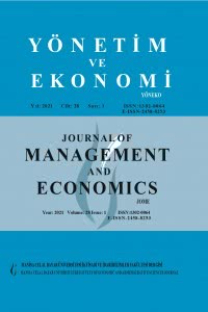Yerel Ekonomik Kalkınma ve Uluslararası Organizasyonlar
Local Economic Development Approach and International Organizations
___
- 1. AFFORD (2000), Globalisation and Development: A Diaspora Dimension, Submission by the African Foundation for Development (AFFORD) to Department for International Development’s White Paper on Globalisation and Development, May, London, http://www.afford-uk.org/resources/download/diasporadimension. pdf (10/06/2006).
- 2. BARTIK, T. J. (2003), “Local Economic Development Policies”, Upjohn Institute Staff Working Paper, 03-91, January, 1-59.
- 3. CANZANELLI, G. ve DICHTER, G. (2001), “Local Economic Development, Human Development, and Decent Work: Best Practices and Trends”, ILO Working Papers, Nowember, 1-14.
- 4. CASANOVA, F. (2004), Local Development, Productive Networks and Training: Alternative Approaches to Training and Work for Young People, ILO.
- 5. ECARD (2005), Implementation Axis for Rural Development Policy, European Commission Agriculture and Rural Development, 2007-2013, http://www.sustainable-euregions.net/documentbank/Peggy%20Dieryckxvisschers %20-%20 DG%20Agri%20.ppt (12/06/2006).
- 6. ECOTEC (2002), Thematic Evaluation of the Territorial Employment Pacts, Final Report to Directorate General Regional Policy, ECOTEC Research and Consulting Limited, October.
- 7. EU (1999), Guide to Territorial Employment Pacts: 2000-2006, Commission Staff Working Document, (November), 1-20.
- 8. EU (2005), European Social Fund (2000-2006), European Union, http://www.esf.gov.uk/_docs/ESF_brochure_08.pdf (05/06/2006).
- 9. EUROPA (2006), Territorial Employment Pacts, Regional Policy-Inforegio, Actions: 1994-1999, http://europa.eu.int/comm/regional_policy/innovation/ innovating/pacts/en/index.html (22/02/2006).
- 10.HEATHER, C. (2004), “Capacity Leads, Capital Follows: Donors and Investors Match Instruments to ACLEDA’s Stage of Development”, Case Studies in Donor Good Practices, 14 (June), 1-4.
- 11.HELMSING, B. (2001), “Local Economic Development: New Generations of Actors, Policies and Instruments”, A Summary Report prepared for the UNCDF Symposium on Decentralization Local Governance in Africa, 59-78.
- 12.ILO (1999), Report of the Director-General, Decent Work, Geneva: ILO.
- 13.ILO (2003), Local Economic Recovery, in Focus Programme on Crisis Response and Reconstruction Recovery and Reconstruction Department, ILO, May. http://www.ilo.org/public/english/employment/recon/crisis/download/lec.pdf, (08/05/2006).
- 14.ILO (2004), The Social Dimension of Globalization, Summary of ILO Report: A Fair Globalization: Creating Opportunities for all, World Commission on the Social Dimension of Globalization, Geneva: ILO.
- 15.IONESCU, D. (2003), Financing Women Entrepreneurship: A Global Challenge, OECD Experience, http://www.oecd.org/dataoecd/22/38/7349273.pdf (09/04/2006)
- 16.JOHNSTON, D. J. (2003), Inauguration of the OECD LEED Centre for Local Development, Palace of the Autonomous Province of Trento, Trento, (6 December)
- 17.LAURENCE, E. R. (2003), “The Three Tensions of Globalization”, Issue in Global Education, 176, 1-4.
- 18.LAZARTE, A., HOFMEIJER, H. ve ZWANENBURG, M. (1997), Local Economic Development in Central America: The PRODERE Experience, ILO, http://www.ilo.org/public/english/employment/ent/papers/prodere.html (01/07/2006).
- 19.LEVIN, M. (2001), The Role of Cooperatives in Providing Local Answers to Globalization, Keynote Speech to the 10th National Cooperative Congress, San Jose, Costa Rica, (29 March).
- 20.LIM, S. H. (2003), “Local Partnership and Human Resources Development”, Paper prepared for KLI/ILO Tripartite Workshop on Skill Development, High Performance, Work Organization and Social Dialog, Seoul, Korea, (6 March), 1-28.
- 21.OECD (2004a), The Role of the European Union in Local and Regional Development, World Bank Institute City Round, Paris, (16 February).
- 22.OECD (2004b), Case Study of the West Midlands: United Kingdom, OECD Local Entrepreneurship Reviews, Final Report, 1-307.
- 23.OECD (2006a), The LEED Partners Club Network, LEED Programme (Local Economic and Employment Development), LEED Directing Committee, https://www.oecd.org/document/38/0,2340,en_2649_34417_2078246_1_1_1_1,00.html (10/06/2006).
- 24.OECD (2006b), LEED Series of Studies, LEED Programme (Local Economic and Employment Development), http://www.oecd.org/document/23/0,2340,en_2649_ 34417_35092851_1_1_1_1,00.html (18/05/2006).
- 25.RODRIGUEZ-POSE, A. (2001), “The Role of the ILO in Implementing Local Economic Development Strategies in a Globalized World”, Working Papers, London, (31 December), 1-19.
- 26.SATURNINUS, K. M. (2002), Globalisation Challanges on Local Economic Development, Uganda Management Institute, Kam, http://www.mdpafrica.org.zw/ Publications/ALGAF%20IV%20Session%20XI.pdf (15/05/2006).
- 27.SEN, A. (2003), Globalization and Local Development, Workshop, (27-28 November), 1-9.
- 28.STAMER, J.M. (2003), “Why is Local Economic Development so difficult, and What can we do to make it more effective?”, Mesopartner Working Paper, 4, Duisburg, 1-41.
- 29.STRAUSS, R. (2004), Local Governance for Promoting Employment, The Local Dimension of the European Employment Strategy, http://www.jil.go.jp/english/ events_and_information/documents/20050209/chapter4.pdf (18/06/2006).
- 30.THEODOROS, M. ve DIMITRIS, K. (2003), “Medium Size Cities Economic Development and Regional Competitiveness: The Case of Larissa-Volos Dipole in Thessaly Region of Greece”, Paper presented to the: 9th Regional Studies Association International Conference ‘Reinventing Regions in a Global Economy’ Pisa Conference Center, (12-15 April 2003), 1-32.
- 31.UNECE (2005), The Wye Group-Handbook on Rural Households’ Livelihood and Well-Being, Annex 2: A Summary of EU Agricultere and Rural Development Policies, (20 April), http://www.unece.org/stats/rural/annex2.pdf (19/05/2006).
- 32.Van BOEKEL, G. ve Van Logtestijn, M. (2002), Applying the Comprehensive LED Approach: The Case of Mozambique, Cooperative Branch International Labour Office, Geneva: Switzerland.
- 33.WEFO (2002), European Structural Funds in Wales, Welsh European Funding Office, October, http://www.wefo.wales.gov.uk/resource/FactSheet_1_FundsWales_e1172.pdf (21/05/2006).
- 34.WEISS (2004), “Globalization, Geography and Regional Policy”, ADB Institute Discussion Paper, 27, (April), 1-15.
- ISSN: 1302-0064
- Yayın Aralığı: Yılda 4 Sayı
- Yayıncı: Manisa Celal Bayar Üniversitesi İktisadi ve İdari Bilimler Fakültesi
Yunus CERAN, Editörden, Recep ÇİÇEK
Kamu Üniversiteleri Öğretim Elemanlarının İş Tatmini Düzeyini Etkileyen Faktörler
Filiz KARAMAN, Ali Ender ALTUNOĞLU
Türkiye'de Küreselleşmenin Vergi Politikaları Üzerine Etkileri: 1980-2005 Dönemi
Veli KARGI, H. Yasemin ÖZUĞURLU
Yeniden Yapılandırma Döneminde Türk Bankacılık Sektöründe Verimlilik Değişimi
Serkan ADA, Semra ÖNCÜ, Rabia AKTAŞ
Konut Finansman Modeli Olarak Yapı Tasarruf Sandıkları; Almanya ve Türkiye’deki Uygulamaları
Semra ÖNCÜ, Selim KILIÇ, Rabia AKTAŞ
Çin’de İş Yapmanın Etik Sorunları
Veli KARGI, Serkan ADA, H. Yasemin ÖZUĞURLU
Mahalli İdarelerin Hizmet Sunumunda Etkinlik: Salihli Belediyesi Jeotermal Örneği
Avrupa Merkez Bankası ile TCMB'nin Bağımsızlıklarının Karşılaştırılması ve Ekonomiye Etkileri
